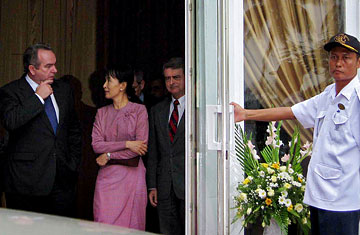
Aung San Suu Kyi, second from left, talks with U.S. Assistant Secretary of State Kurt Campbell following their meeting at a hotel in Rangoon, Burma, on Nov. 4, 2009
The first high-level team of U.S. diplomats to visit Burma in 14 years met with detained opposition leader Aung San Suu Kyi in Rangoon on Wednesday in what some hope may signal the first steps toward breaking the political deadlock that has gripped Burma for more than 20 years. But Burma analysts say any positive developments from the mission will depend on a man the Americans did not meet: Burma's reclusive military leader, General Than Shwe.
Instead, Assistant Secretary of State Kurt Campbell and his deputy, Scot Marciel, met with Prime Minister Thein Sein, who wields little actual political power, in the inland capital of Naypyidaw on the second day of their two day visit. They later flew to Rangoon to confer with 1991 Nobel Peace Prize winner Suu Kyi, who was allowed to travel from the home where she has spent 14 of the past 20 years under arrest to a downtown hotel where the diplomats were staying.
"Our expectations are modest," says Aung Zaw, editor of the Irrawaddy, an influential Thailand-based magazine on Burma affairs. "We've seen these on-again, off-again discussions many times before with the United Nations and the European Union, among others." Real change, he said, could come only from Than Shwe, the supreme leader since 1992 of the military committee that rules the country and calls itself the State Peace and Development Council. Describing Burma as an oligarchy, Aung Zaw says that if Than Shwe had the political will, "he could solve 40 years of Burma's problems in four hours."
The visit is the second meeting between the nations' diplomats since U.S. President Barack Obama announced in September that his Administration would pursue a policy of engaging the generals who rule the country rather than rebuffing them. The first meeting took place several weeks ago in New York City. Burma has been under military rule since 1962, and since the bloody suppression of a democracy uprising in 1988, the U.S. has incrementally reduced contacts with the regime and increased sanctions against it for its record of violating human rights and quashing democracy. Larry Dinger, the chargé d'affaires at the U.S. embassy in Rangoon, was quoted in the state-run Myanmar Times this week saying Washington wanted to make progress on "important issues" but would maintain sanctions "until concrete progress is made." The State Department has referred to the trip as a "fact-finding mission."
The regime blames Suu Kyi for having called for sanctions in the past. She has said she is open to rescinding the call if the regime agrees to engage in a genuine dialogue with her, her party and ethnic minorities. The junta plans to hold elections next year for the first time since 1990, when it lost to Suu Kyi's party, the National League for Democracy, by a landslide and then ignored the results. Suu Kyi has been barred from participating in the upcoming poll, and unless she is pardoned, she will still be under house arrest when it takes place. Thein Sein recently told Southeast Asian diplomats that the terms of her imprisonment could be eased if she "behaved."
The Obama Administration has said it altered its approach because sanctions alone have not worked in bringing about change in the isolated and impoverished nation. For their part, the generals are interested in improving relations because they are overly reliant on China, which has major investments in Burma, as an ally. The junta wants sanctions removed and its upcoming elections to be regarded as legitimate.
Debbie Stothard, executive director of ALTSEAN, an activist network involved in Burma issues, urged the two U.S. diplomats to stand firm on democracy and human rights during their visit. "The regime won't like it, but they will respect the U.S. more for it. They will know that the U.S. can't be pushed around or fooled like the Association of Southeast Asian Nations," she says. ASEAN, which admitted Burma as a member in 1997, has advocated a course of "constructive engagement" as a way of moderating the regime's behavior, including expanding economic and business ties. Stothard says that policy has failed, as evidenced by what she calls "an all-time high in the number of political prisoners and a spike in military aggression against the country's ethnic minorities."
Aung Zaw credits Campbell, who specializes in East Asian and Pacific affairs for the White House, with being well informed on Burma issues. It was unlikely the regime could pull the wool over his eyes, as it has done to other prominent visitors, he says: "Campbell met and listened to everyone, whether they were Burman, ethnic minorities, proregime or antiregime. Everyone was pleased with that."
